GSK's International Business Strategy in the Indian Market
VerifiedAdded on 2023/01/11
|9
|2668
|63
Report
AI Summary
This report provides a comprehensive analysis of GlaxoSmithKline's (GSK) international business strategy, focusing on its potential expansion into the Indian market. The analysis begins with an evaluation of GSK's readiness for internationalization, followed by a detailed macro-environmental analysis of India using the PEST framework, examining political, economic, social, and technological factors. A national competitive analysis, employing Porter's Five Forces, assesses the competitive landscape. The report also includes a cultural analysis of India using Hofstede's cultural dimensions to evaluate its impact on the internationalization process. Furthermore, it critically evaluates suitable entry and internationalization strategies for GSK, recommending direct exporting. The report concludes with a recommendation for GSK's expansion into India, emphasizing the country's favorable conditions and growth potential. The analysis covers topics like political influences, economic stability, social factors, technological advancements, competitive rivalries, cultural insights, and effective market entry strategies.
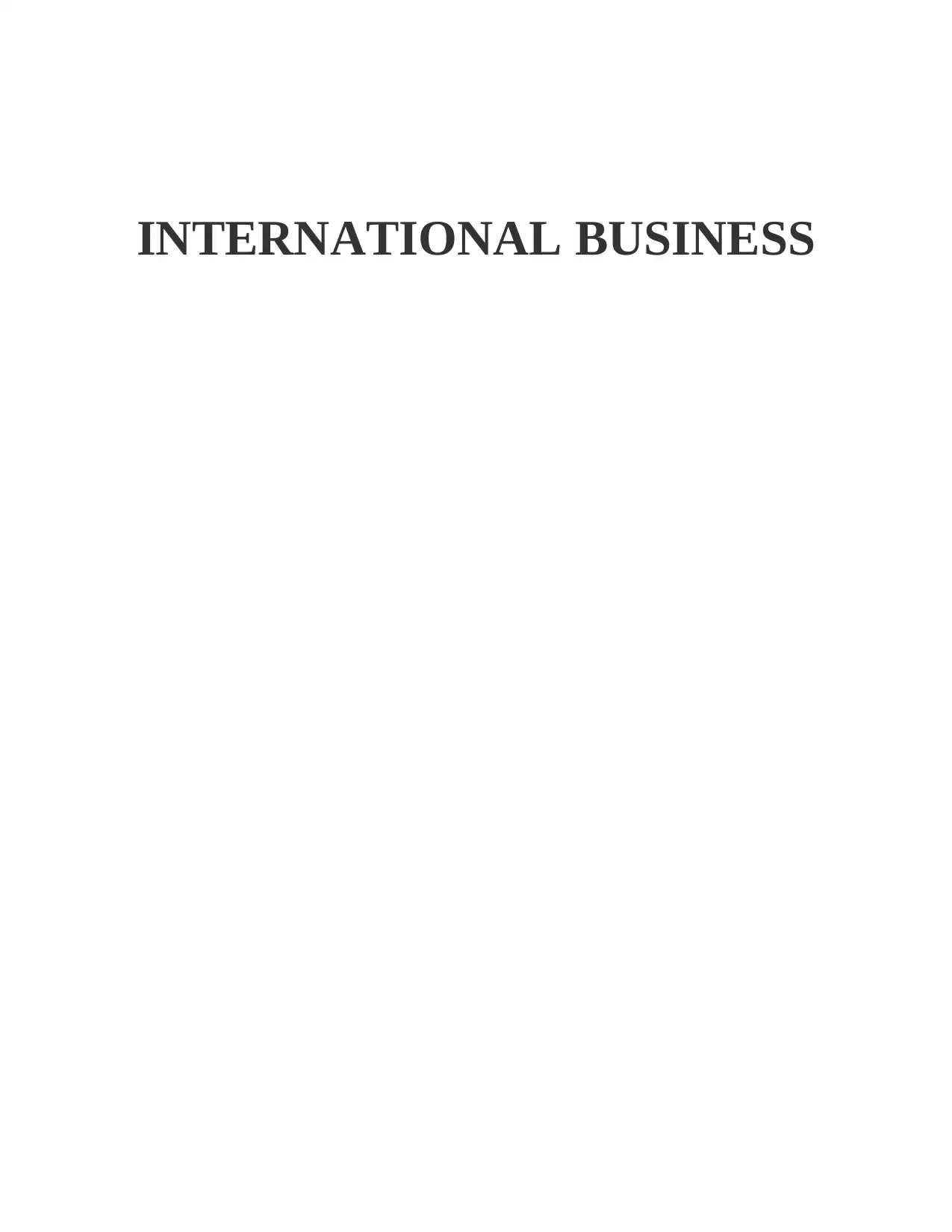
INTERNATIONAL BUSINESS
Paraphrase This Document
Need a fresh take? Get an instant paraphrase of this document with our AI Paraphraser
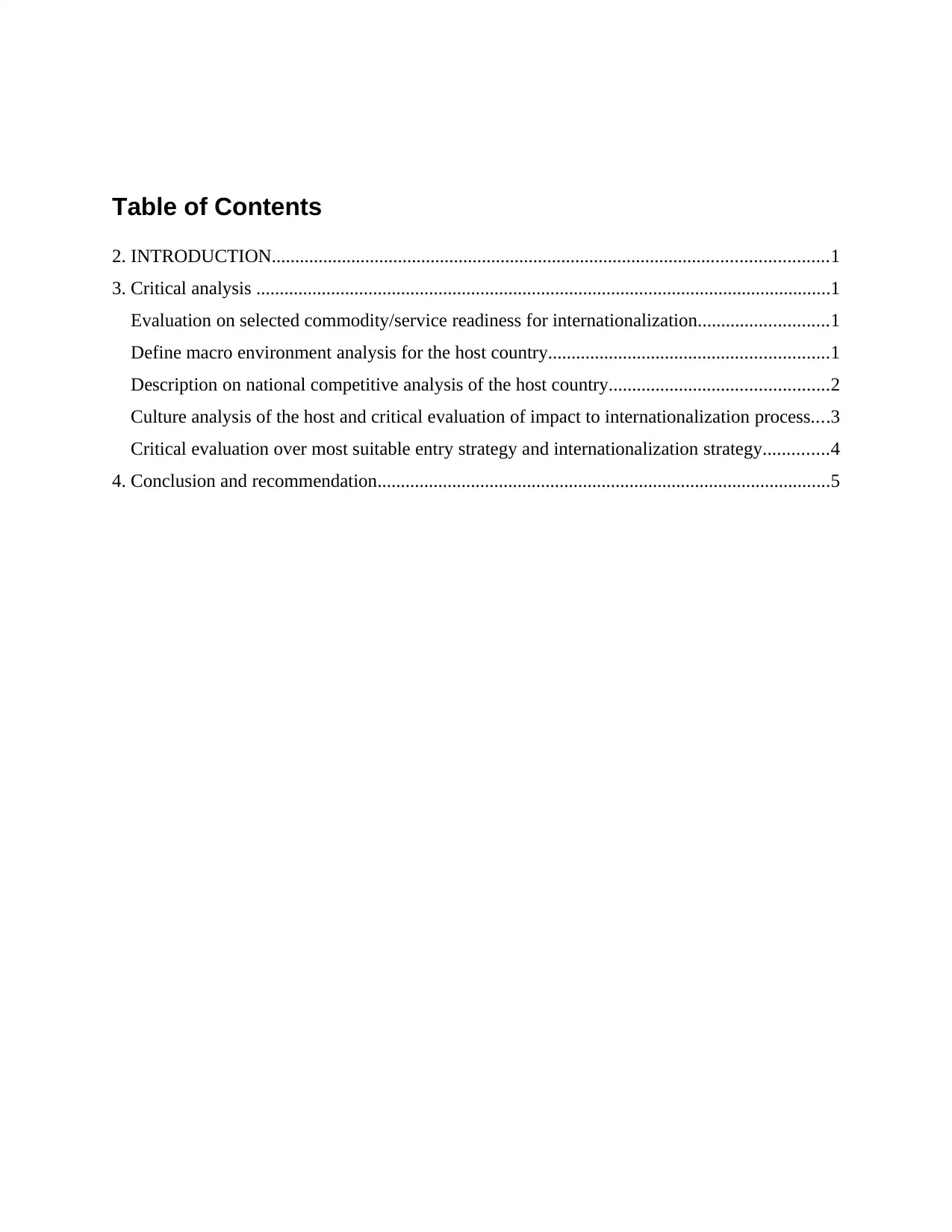
Table of Contents
2. INTRODUCTION.......................................................................................................................1
3. Critical analysis ...........................................................................................................................1
Evaluation on selected commodity/service readiness for internationalization............................1
Define macro environment analysis for the host country............................................................1
Description on national competitive analysis of the host country...............................................2
Culture analysis of the host and critical evaluation of impact to internationalization process....3
Critical evaluation over most suitable entry strategy and internationalization strategy..............4
4. Conclusion and recommendation.................................................................................................5
2. INTRODUCTION.......................................................................................................................1
3. Critical analysis ...........................................................................................................................1
Evaluation on selected commodity/service readiness for internationalization............................1
Define macro environment analysis for the host country............................................................1
Description on national competitive analysis of the host country...............................................2
Culture analysis of the host and critical evaluation of impact to internationalization process....3
Critical evaluation over most suitable entry strategy and internationalization strategy..............4
4. Conclusion and recommendation.................................................................................................5
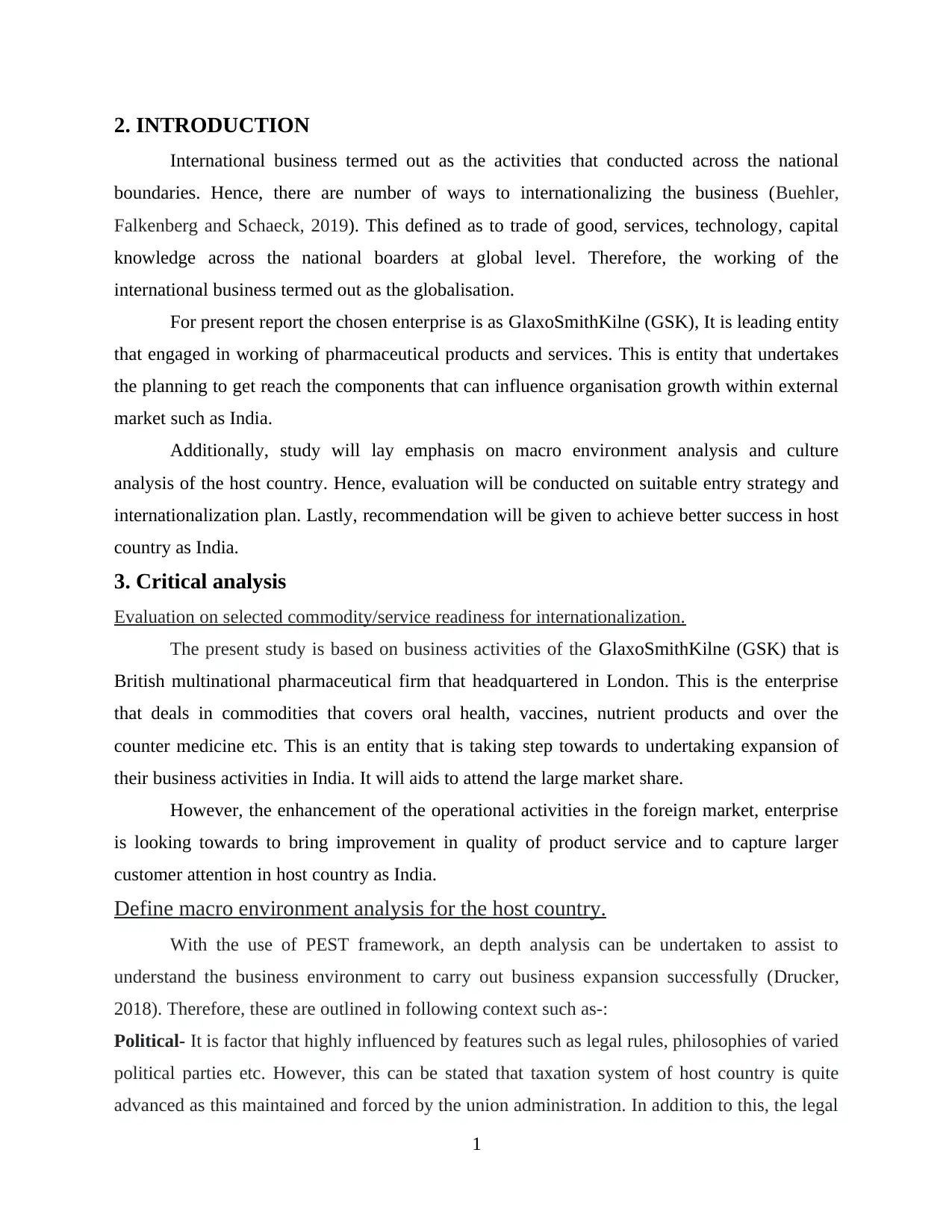
2. INTRODUCTION
International business termed out as the activities that conducted across the national
boundaries. Hence, there are number of ways to internationalizing the business (Buehler,
Falkenberg and Schaeck, 2019). This defined as to trade of good, services, technology, capital
knowledge across the national boarders at global level. Therefore, the working of the
international business termed out as the globalisation.
For present report the chosen enterprise is as GlaxoSmithKilne (GSK), It is leading entity
that engaged in working of pharmaceutical products and services. This is entity that undertakes
the planning to get reach the components that can influence organisation growth within external
market such as India.
Additionally, study will lay emphasis on macro environment analysis and culture
analysis of the host country. Hence, evaluation will be conducted on suitable entry strategy and
internationalization plan. Lastly, recommendation will be given to achieve better success in host
country as India.
3. Critical analysis
Evaluation on selected commodity/service readiness for internationalization.
The present study is based on business activities of the GlaxoSmithKilne (GSK) that is
British multinational pharmaceutical firm that headquartered in London. This is the enterprise
that deals in commodities that covers oral health, vaccines, nutrient products and over the
counter medicine etc. This is an entity that is taking step towards to undertaking expansion of
their business activities in India. It will aids to attend the large market share.
However, the enhancement of the operational activities in the foreign market, enterprise
is looking towards to bring improvement in quality of product service and to capture larger
customer attention in host country as India.
Define macro environment analysis for the host country.
With the use of PEST framework, an depth analysis can be undertaken to assist to
understand the business environment to carry out business expansion successfully (Drucker,
2018). Therefore, these are outlined in following context such as-:
Political- It is factor that highly influenced by features such as legal rules, philosophies of varied
political parties etc. However, this can be stated that taxation system of host country is quite
advanced as this maintained and forced by the union administration. In addition to this, the legal
1
International business termed out as the activities that conducted across the national
boundaries. Hence, there are number of ways to internationalizing the business (Buehler,
Falkenberg and Schaeck, 2019). This defined as to trade of good, services, technology, capital
knowledge across the national boarders at global level. Therefore, the working of the
international business termed out as the globalisation.
For present report the chosen enterprise is as GlaxoSmithKilne (GSK), It is leading entity
that engaged in working of pharmaceutical products and services. This is entity that undertakes
the planning to get reach the components that can influence organisation growth within external
market such as India.
Additionally, study will lay emphasis on macro environment analysis and culture
analysis of the host country. Hence, evaluation will be conducted on suitable entry strategy and
internationalization plan. Lastly, recommendation will be given to achieve better success in host
country as India.
3. Critical analysis
Evaluation on selected commodity/service readiness for internationalization.
The present study is based on business activities of the GlaxoSmithKilne (GSK) that is
British multinational pharmaceutical firm that headquartered in London. This is the enterprise
that deals in commodities that covers oral health, vaccines, nutrient products and over the
counter medicine etc. This is an entity that is taking step towards to undertaking expansion of
their business activities in India. It will aids to attend the large market share.
However, the enhancement of the operational activities in the foreign market, enterprise
is looking towards to bring improvement in quality of product service and to capture larger
customer attention in host country as India.
Define macro environment analysis for the host country.
With the use of PEST framework, an depth analysis can be undertaken to assist to
understand the business environment to carry out business expansion successfully (Drucker,
2018). Therefore, these are outlined in following context such as-:
Political- It is factor that highly influenced by features such as legal rules, philosophies of varied
political parties etc. However, this can be stated that taxation system of host country is quite
advanced as this maintained and forced by the union administration. In addition to this, the legal
1
⊘ This is a preview!⊘
Do you want full access?
Subscribe today to unlock all pages.

Trusted by 1+ million students worldwide
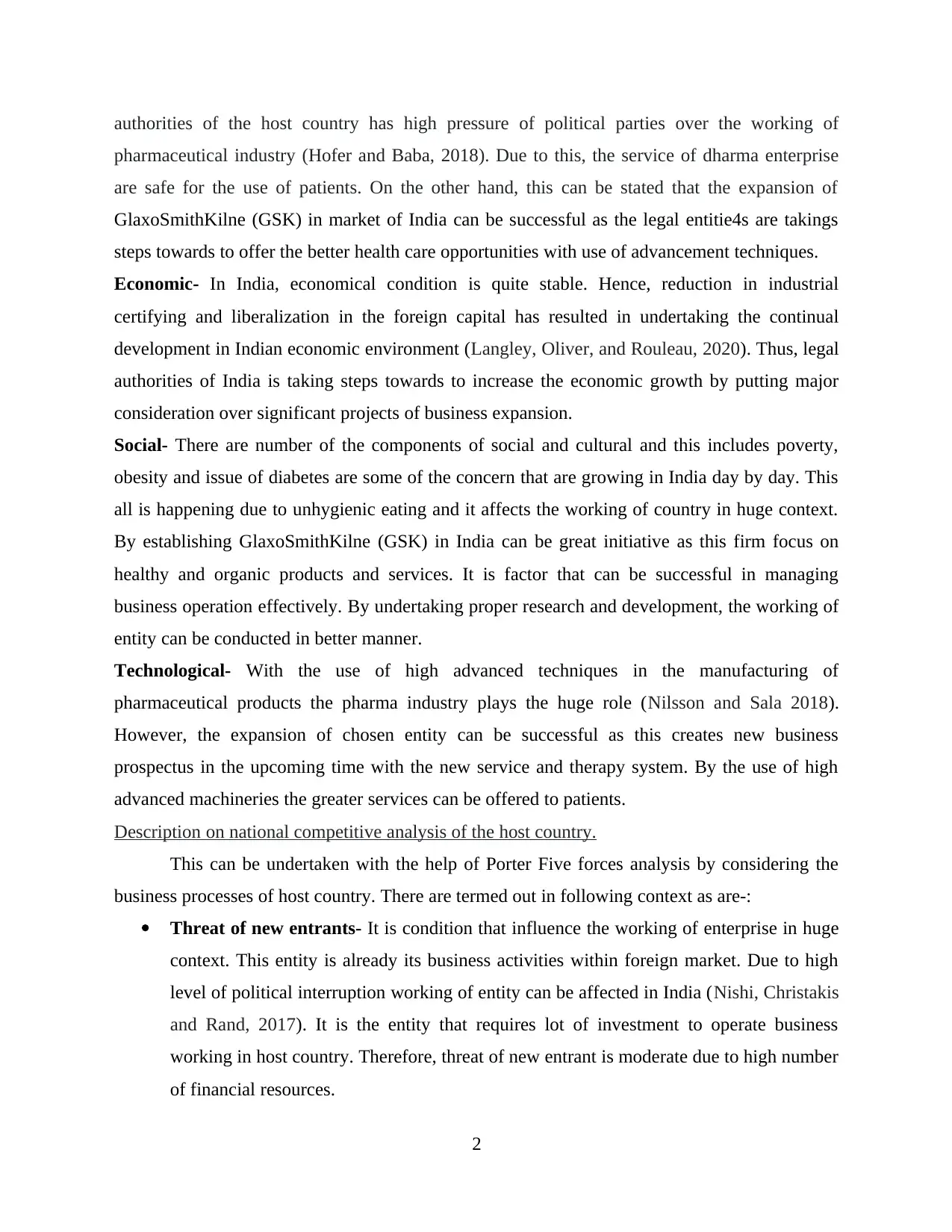
authorities of the host country has high pressure of political parties over the working of
pharmaceutical industry (Hofer and Baba, 2018). Due to this, the service of dharma enterprise
are safe for the use of patients. On the other hand, this can be stated that the expansion of
GlaxoSmithKilne (GSK) in market of India can be successful as the legal entitie4s are takings
steps towards to offer the better health care opportunities with use of advancement techniques.
Economic- In India, economical condition is quite stable. Hence, reduction in industrial
certifying and liberalization in the foreign capital has resulted in undertaking the continual
development in Indian economic environment (Langley, Oliver, and Rouleau, 2020). Thus, legal
authorities of India is taking steps towards to increase the economic growth by putting major
consideration over significant projects of business expansion.
Social- There are number of the components of social and cultural and this includes poverty,
obesity and issue of diabetes are some of the concern that are growing in India day by day. This
all is happening due to unhygienic eating and it affects the working of country in huge context.
By establishing GlaxoSmithKilne (GSK) in India can be great initiative as this firm focus on
healthy and organic products and services. It is factor that can be successful in managing
business operation effectively. By undertaking proper research and development, the working of
entity can be conducted in better manner.
Technological- With the use of high advanced techniques in the manufacturing of
pharmaceutical products the pharma industry plays the huge role (Nilsson and Sala 2018).
However, the expansion of chosen entity can be successful as this creates new business
prospectus in the upcoming time with the new service and therapy system. By the use of high
advanced machineries the greater services can be offered to patients.
Description on national competitive analysis of the host country.
This can be undertaken with the help of Porter Five forces analysis by considering the
business processes of host country. There are termed out in following context as are-:
Threat of new entrants- It is condition that influence the working of enterprise in huge
context. This entity is already its business activities within foreign market. Due to high
level of political interruption working of entity can be affected in India (Nishi, Christakis
and Rand, 2017). It is the entity that requires lot of investment to operate business
working in host country. Therefore, threat of new entrant is moderate due to high number
of financial resources.
2
pharmaceutical industry (Hofer and Baba, 2018). Due to this, the service of dharma enterprise
are safe for the use of patients. On the other hand, this can be stated that the expansion of
GlaxoSmithKilne (GSK) in market of India can be successful as the legal entitie4s are takings
steps towards to offer the better health care opportunities with use of advancement techniques.
Economic- In India, economical condition is quite stable. Hence, reduction in industrial
certifying and liberalization in the foreign capital has resulted in undertaking the continual
development in Indian economic environment (Langley, Oliver, and Rouleau, 2020). Thus, legal
authorities of India is taking steps towards to increase the economic growth by putting major
consideration over significant projects of business expansion.
Social- There are number of the components of social and cultural and this includes poverty,
obesity and issue of diabetes are some of the concern that are growing in India day by day. This
all is happening due to unhygienic eating and it affects the working of country in huge context.
By establishing GlaxoSmithKilne (GSK) in India can be great initiative as this firm focus on
healthy and organic products and services. It is factor that can be successful in managing
business operation effectively. By undertaking proper research and development, the working of
entity can be conducted in better manner.
Technological- With the use of high advanced techniques in the manufacturing of
pharmaceutical products the pharma industry plays the huge role (Nilsson and Sala 2018).
However, the expansion of chosen entity can be successful as this creates new business
prospectus in the upcoming time with the new service and therapy system. By the use of high
advanced machineries the greater services can be offered to patients.
Description on national competitive analysis of the host country.
This can be undertaken with the help of Porter Five forces analysis by considering the
business processes of host country. There are termed out in following context as are-:
Threat of new entrants- It is condition that influence the working of enterprise in huge
context. This entity is already its business activities within foreign market. Due to high
level of political interruption working of entity can be affected in India (Nishi, Christakis
and Rand, 2017). It is the entity that requires lot of investment to operate business
working in host country. Therefore, threat of new entrant is moderate due to high number
of financial resources.
2
Paraphrase This Document
Need a fresh take? Get an instant paraphrase of this document with our AI Paraphraser
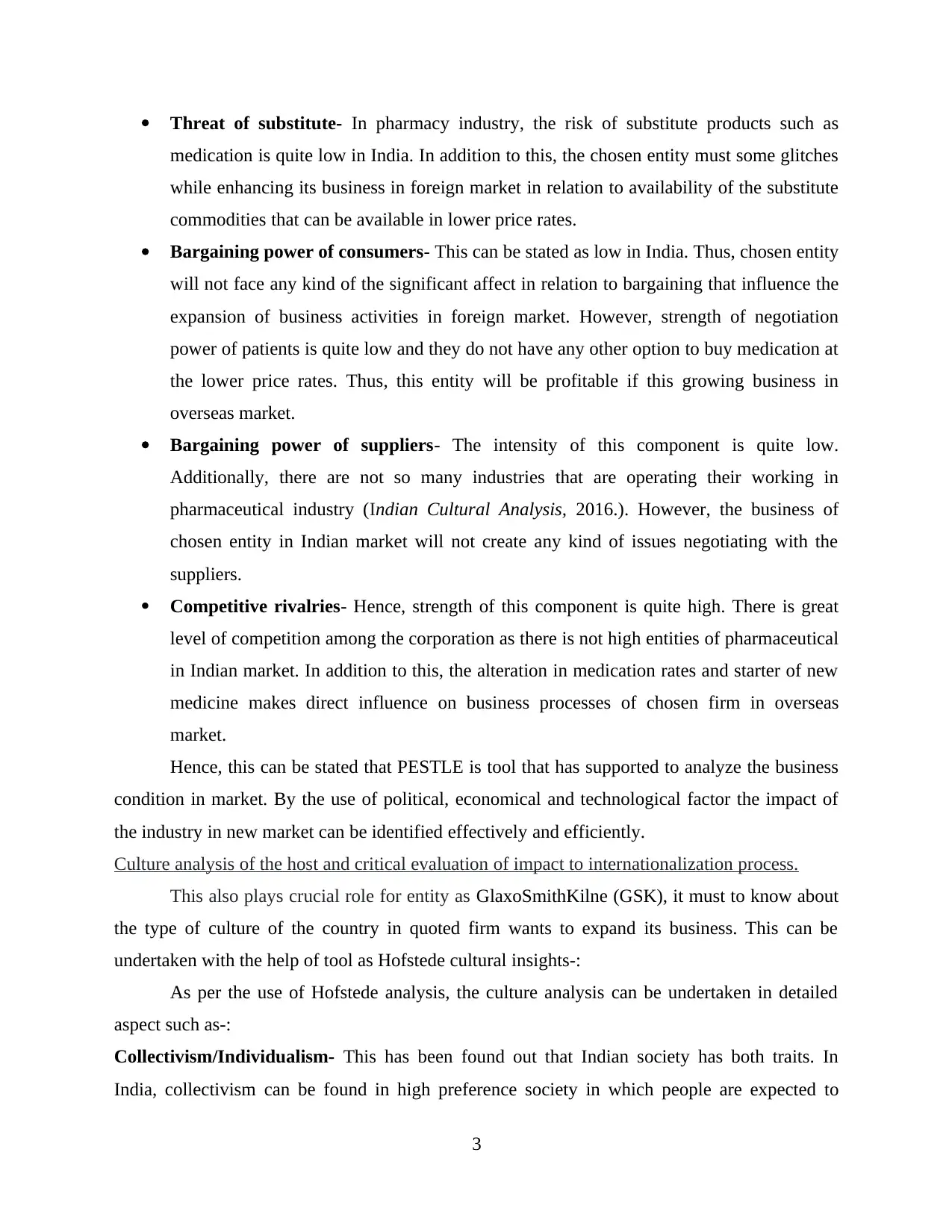
Threat of substitute- In pharmacy industry, the risk of substitute products such as
medication is quite low in India. In addition to this, the chosen entity must some glitches
while enhancing its business in foreign market in relation to availability of the substitute
commodities that can be available in lower price rates.
Bargaining power of consumers- This can be stated as low in India. Thus, chosen entity
will not face any kind of the significant affect in relation to bargaining that influence the
expansion of business activities in foreign market. However, strength of negotiation
power of patients is quite low and they do not have any other option to buy medication at
the lower price rates. Thus, this entity will be profitable if this growing business in
overseas market.
Bargaining power of suppliers- The intensity of this component is quite low.
Additionally, there are not so many industries that are operating their working in
pharmaceutical industry (Indian Cultural Analysis, 2016.). However, the business of
chosen entity in Indian market will not create any kind of issues negotiating with the
suppliers.
Competitive rivalries- Hence, strength of this component is quite high. There is great
level of competition among the corporation as there is not high entities of pharmaceutical
in Indian market. In addition to this, the alteration in medication rates and starter of new
medicine makes direct influence on business processes of chosen firm in overseas
market.
Hence, this can be stated that PESTLE is tool that has supported to analyze the business
condition in market. By the use of political, economical and technological factor the impact of
the industry in new market can be identified effectively and efficiently.
Culture analysis of the host and critical evaluation of impact to internationalization process.
This also plays crucial role for entity as GlaxoSmithKilne (GSK), it must to know about
the type of culture of the country in quoted firm wants to expand its business. This can be
undertaken with the help of tool as Hofstede cultural insights-:
As per the use of Hofstede analysis, the culture analysis can be undertaken in detailed
aspect such as-:
Collectivism/Individualism- This has been found out that Indian society has both traits. In
India, collectivism can be found in high preference society in which people are expected to
3
medication is quite low in India. In addition to this, the chosen entity must some glitches
while enhancing its business in foreign market in relation to availability of the substitute
commodities that can be available in lower price rates.
Bargaining power of consumers- This can be stated as low in India. Thus, chosen entity
will not face any kind of the significant affect in relation to bargaining that influence the
expansion of business activities in foreign market. However, strength of negotiation
power of patients is quite low and they do not have any other option to buy medication at
the lower price rates. Thus, this entity will be profitable if this growing business in
overseas market.
Bargaining power of suppliers- The intensity of this component is quite low.
Additionally, there are not so many industries that are operating their working in
pharmaceutical industry (Indian Cultural Analysis, 2016.). However, the business of
chosen entity in Indian market will not create any kind of issues negotiating with the
suppliers.
Competitive rivalries- Hence, strength of this component is quite high. There is great
level of competition among the corporation as there is not high entities of pharmaceutical
in Indian market. In addition to this, the alteration in medication rates and starter of new
medicine makes direct influence on business processes of chosen firm in overseas
market.
Hence, this can be stated that PESTLE is tool that has supported to analyze the business
condition in market. By the use of political, economical and technological factor the impact of
the industry in new market can be identified effectively and efficiently.
Culture analysis of the host and critical evaluation of impact to internationalization process.
This also plays crucial role for entity as GlaxoSmithKilne (GSK), it must to know about
the type of culture of the country in quoted firm wants to expand its business. This can be
undertaken with the help of tool as Hofstede cultural insights-:
As per the use of Hofstede analysis, the culture analysis can be undertaken in detailed
aspect such as-:
Collectivism/Individualism- This has been found out that Indian society has both traits. In
India, collectivism can be found in high preference society in which people are expected to
3
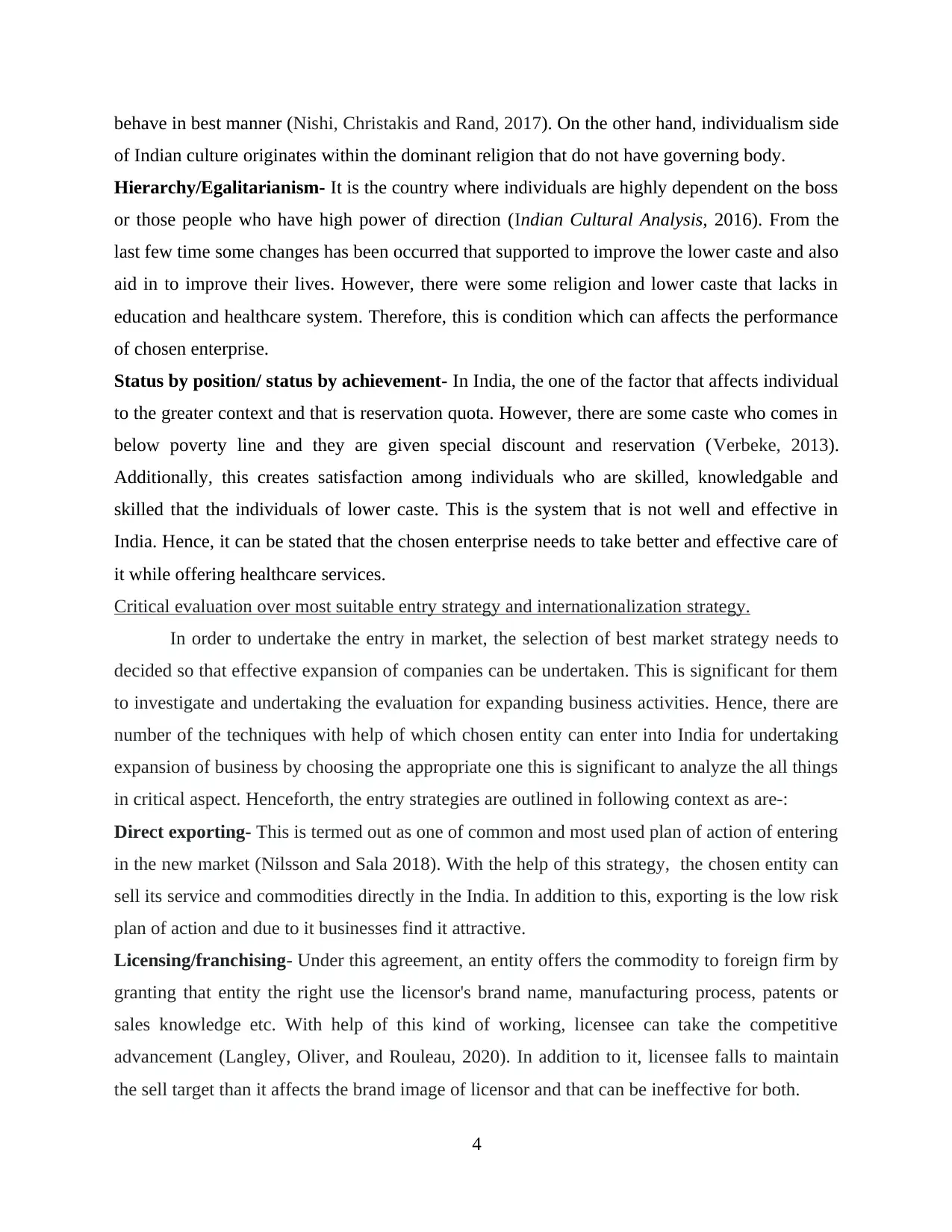
behave in best manner (Nishi, Christakis and Rand, 2017). On the other hand, individualism side
of Indian culture originates within the dominant religion that do not have governing body.
Hierarchy/Egalitarianism- It is the country where individuals are highly dependent on the boss
or those people who have high power of direction (Indian Cultural Analysis, 2016). From the
last few time some changes has been occurred that supported to improve the lower caste and also
aid in to improve their lives. However, there were some religion and lower caste that lacks in
education and healthcare system. Therefore, this is condition which can affects the performance
of chosen enterprise.
Status by position/ status by achievement- In India, the one of the factor that affects individual
to the greater context and that is reservation quota. However, there are some caste who comes in
below poverty line and they are given special discount and reservation (Verbeke, 2013).
Additionally, this creates satisfaction among individuals who are skilled, knowledgable and
skilled that the individuals of lower caste. This is the system that is not well and effective in
India. Hence, it can be stated that the chosen enterprise needs to take better and effective care of
it while offering healthcare services.
Critical evaluation over most suitable entry strategy and internationalization strategy.
In order to undertake the entry in market, the selection of best market strategy needs to
decided so that effective expansion of companies can be undertaken. This is significant for them
to investigate and undertaking the evaluation for expanding business activities. Hence, there are
number of the techniques with help of which chosen entity can enter into India for undertaking
expansion of business by choosing the appropriate one this is significant to analyze the all things
in critical aspect. Henceforth, the entry strategies are outlined in following context as are-:
Direct exporting- This is termed out as one of common and most used plan of action of entering
in the new market (Nilsson and Sala 2018). With the help of this strategy, the chosen entity can
sell its service and commodities directly in the India. In addition to this, exporting is the low risk
plan of action and due to it businesses find it attractive.
Licensing/franchising- Under this agreement, an entity offers the commodity to foreign firm by
granting that entity the right use the licensor's brand name, manufacturing process, patents or
sales knowledge etc. With help of this kind of working, licensee can take the competitive
advancement (Langley, Oliver, and Rouleau, 2020). In addition to it, licensee falls to maintain
the sell target than it affects the brand image of licensor and that can be ineffective for both.
4
of Indian culture originates within the dominant religion that do not have governing body.
Hierarchy/Egalitarianism- It is the country where individuals are highly dependent on the boss
or those people who have high power of direction (Indian Cultural Analysis, 2016). From the
last few time some changes has been occurred that supported to improve the lower caste and also
aid in to improve their lives. However, there were some religion and lower caste that lacks in
education and healthcare system. Therefore, this is condition which can affects the performance
of chosen enterprise.
Status by position/ status by achievement- In India, the one of the factor that affects individual
to the greater context and that is reservation quota. However, there are some caste who comes in
below poverty line and they are given special discount and reservation (Verbeke, 2013).
Additionally, this creates satisfaction among individuals who are skilled, knowledgable and
skilled that the individuals of lower caste. This is the system that is not well and effective in
India. Hence, it can be stated that the chosen enterprise needs to take better and effective care of
it while offering healthcare services.
Critical evaluation over most suitable entry strategy and internationalization strategy.
In order to undertake the entry in market, the selection of best market strategy needs to
decided so that effective expansion of companies can be undertaken. This is significant for them
to investigate and undertaking the evaluation for expanding business activities. Hence, there are
number of the techniques with help of which chosen entity can enter into India for undertaking
expansion of business by choosing the appropriate one this is significant to analyze the all things
in critical aspect. Henceforth, the entry strategies are outlined in following context as are-:
Direct exporting- This is termed out as one of common and most used plan of action of entering
in the new market (Nilsson and Sala 2018). With the help of this strategy, the chosen entity can
sell its service and commodities directly in the India. In addition to this, exporting is the low risk
plan of action and due to it businesses find it attractive.
Licensing/franchising- Under this agreement, an entity offers the commodity to foreign firm by
granting that entity the right use the licensor's brand name, manufacturing process, patents or
sales knowledge etc. With help of this kind of working, licensee can take the competitive
advancement (Langley, Oliver, and Rouleau, 2020). In addition to it, licensee falls to maintain
the sell target than it affects the brand image of licensor and that can be ineffective for both.
4
⊘ This is a preview!⊘
Do you want full access?
Subscribe today to unlock all pages.

Trusted by 1+ million students worldwide
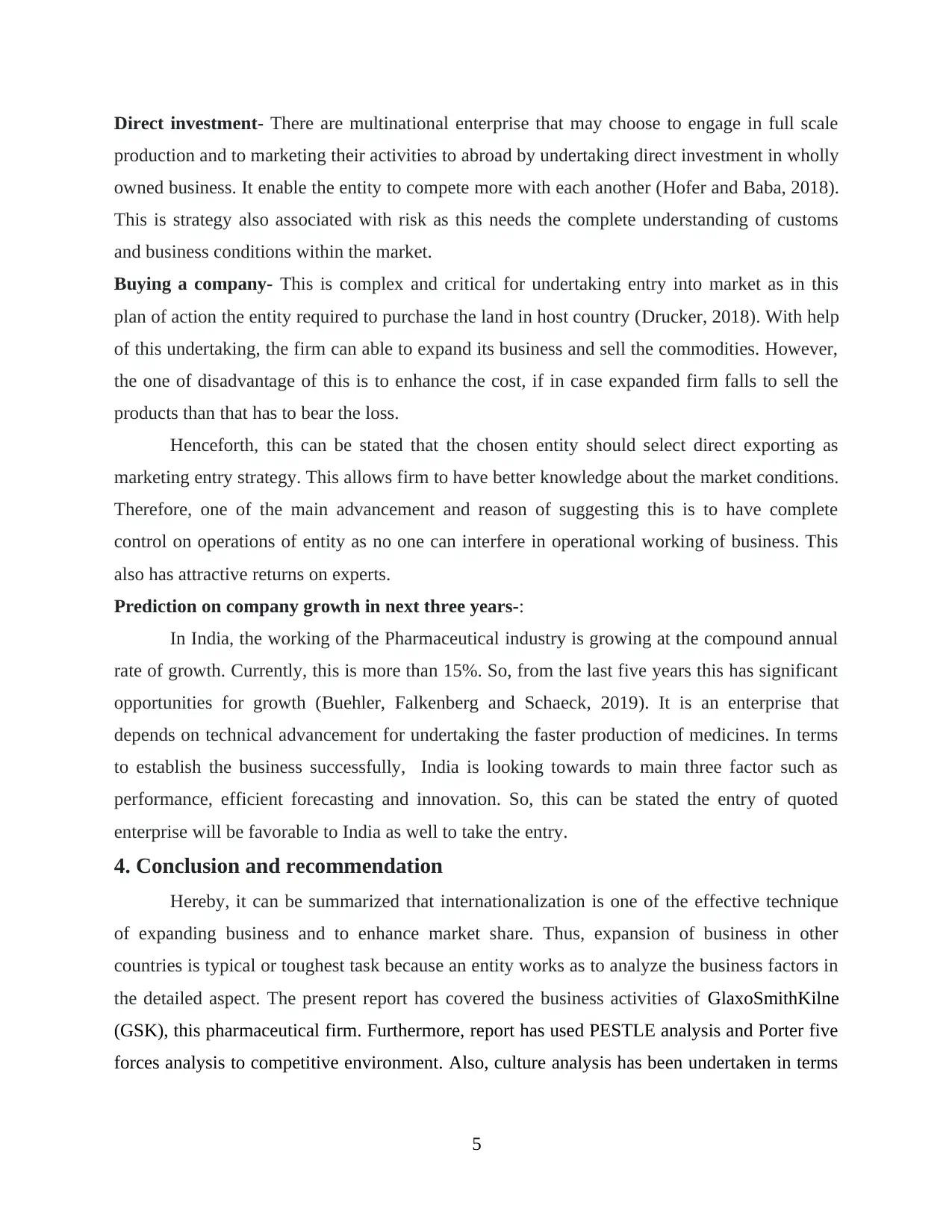
Direct investment- There are multinational enterprise that may choose to engage in full scale
production and to marketing their activities to abroad by undertaking direct investment in wholly
owned business. It enable the entity to compete more with each another (Hofer and Baba, 2018).
This is strategy also associated with risk as this needs the complete understanding of customs
and business conditions within the market.
Buying a company- This is complex and critical for undertaking entry into market as in this
plan of action the entity required to purchase the land in host country (Drucker, 2018). With help
of this undertaking, the firm can able to expand its business and sell the commodities. However,
the one of disadvantage of this is to enhance the cost, if in case expanded firm falls to sell the
products than that has to bear the loss.
Henceforth, this can be stated that the chosen entity should select direct exporting as
marketing entry strategy. This allows firm to have better knowledge about the market conditions.
Therefore, one of the main advancement and reason of suggesting this is to have complete
control on operations of entity as no one can interfere in operational working of business. This
also has attractive returns on experts.
Prediction on company growth in next three years-:
In India, the working of the Pharmaceutical industry is growing at the compound annual
rate of growth. Currently, this is more than 15%. So, from the last five years this has significant
opportunities for growth (Buehler, Falkenberg and Schaeck, 2019). It is an enterprise that
depends on technical advancement for undertaking the faster production of medicines. In terms
to establish the business successfully, India is looking towards to main three factor such as
performance, efficient forecasting and innovation. So, this can be stated the entry of quoted
enterprise will be favorable to India as well to take the entry.
4. Conclusion and recommendation
Hereby, it can be summarized that internationalization is one of the effective technique
of expanding business and to enhance market share. Thus, expansion of business in other
countries is typical or toughest task because an entity works as to analyze the business factors in
the detailed aspect. The present report has covered the business activities of GlaxoSmithKilne
(GSK), this pharmaceutical firm. Furthermore, report has used PESTLE analysis and Porter five
forces analysis to competitive environment. Also, culture analysis has been undertaken in terms
5
production and to marketing their activities to abroad by undertaking direct investment in wholly
owned business. It enable the entity to compete more with each another (Hofer and Baba, 2018).
This is strategy also associated with risk as this needs the complete understanding of customs
and business conditions within the market.
Buying a company- This is complex and critical for undertaking entry into market as in this
plan of action the entity required to purchase the land in host country (Drucker, 2018). With help
of this undertaking, the firm can able to expand its business and sell the commodities. However,
the one of disadvantage of this is to enhance the cost, if in case expanded firm falls to sell the
products than that has to bear the loss.
Henceforth, this can be stated that the chosen entity should select direct exporting as
marketing entry strategy. This allows firm to have better knowledge about the market conditions.
Therefore, one of the main advancement and reason of suggesting this is to have complete
control on operations of entity as no one can interfere in operational working of business. This
also has attractive returns on experts.
Prediction on company growth in next three years-:
In India, the working of the Pharmaceutical industry is growing at the compound annual
rate of growth. Currently, this is more than 15%. So, from the last five years this has significant
opportunities for growth (Buehler, Falkenberg and Schaeck, 2019). It is an enterprise that
depends on technical advancement for undertaking the faster production of medicines. In terms
to establish the business successfully, India is looking towards to main three factor such as
performance, efficient forecasting and innovation. So, this can be stated the entry of quoted
enterprise will be favorable to India as well to take the entry.
4. Conclusion and recommendation
Hereby, it can be summarized that internationalization is one of the effective technique
of expanding business and to enhance market share. Thus, expansion of business in other
countries is typical or toughest task because an entity works as to analyze the business factors in
the detailed aspect. The present report has covered the business activities of GlaxoSmithKilne
(GSK), this pharmaceutical firm. Furthermore, report has used PESTLE analysis and Porter five
forces analysis to competitive environment. Also, culture analysis has been undertaken in terms
5
Paraphrase This Document
Need a fresh take? Get an instant paraphrase of this document with our AI Paraphraser
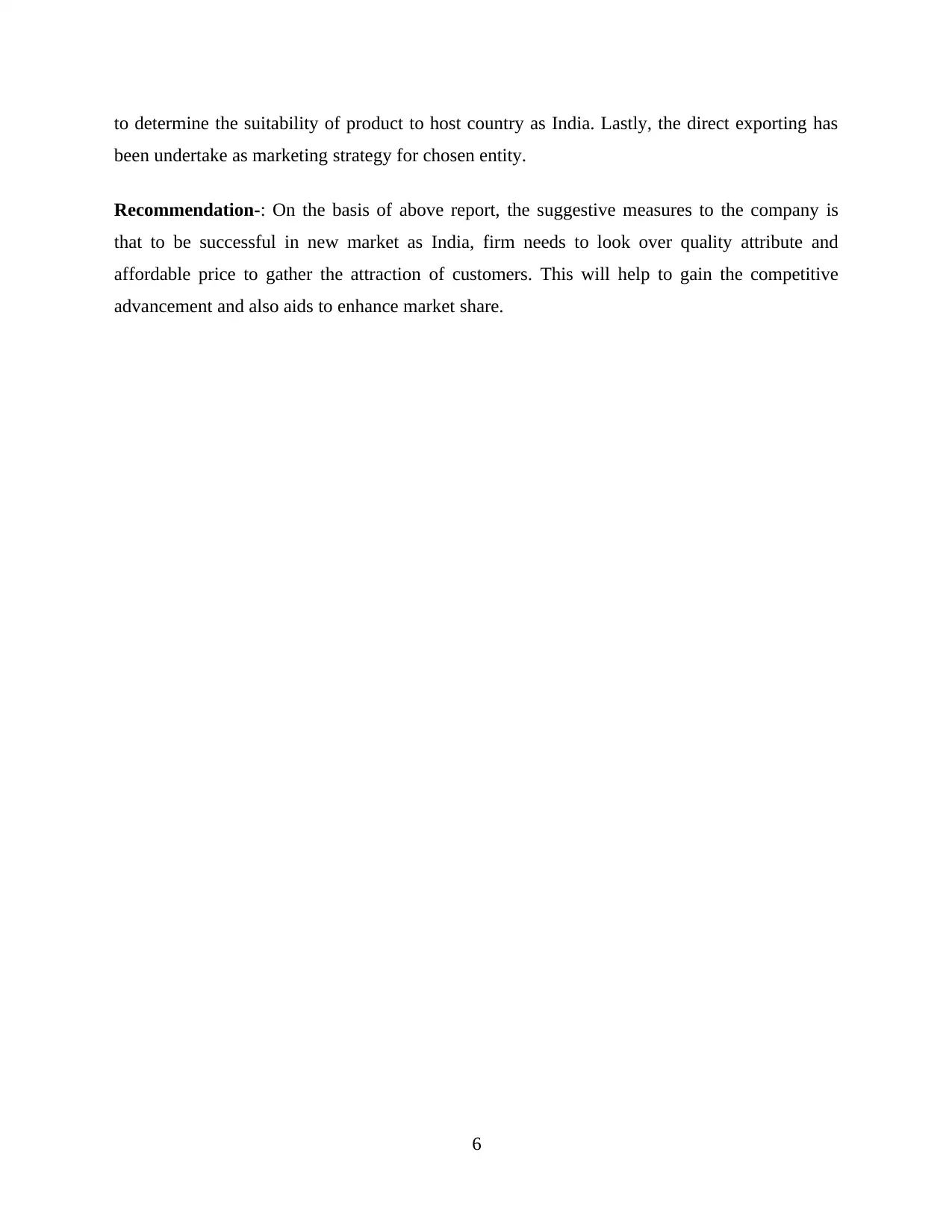
to determine the suitability of product to host country as India. Lastly, the direct exporting has
been undertake as marketing strategy for chosen entity.
Recommendation-: On the basis of above report, the suggestive measures to the company is
that to be successful in new market as India, firm needs to look over quality attribute and
affordable price to gather the attraction of customers. This will help to gain the competitive
advancement and also aids to enhance market share.
6
been undertake as marketing strategy for chosen entity.
Recommendation-: On the basis of above report, the suggestive measures to the company is
that to be successful in new market as India, firm needs to look over quality attribute and
affordable price to gather the attraction of customers. This will help to gain the competitive
advancement and also aids to enhance market share.
6
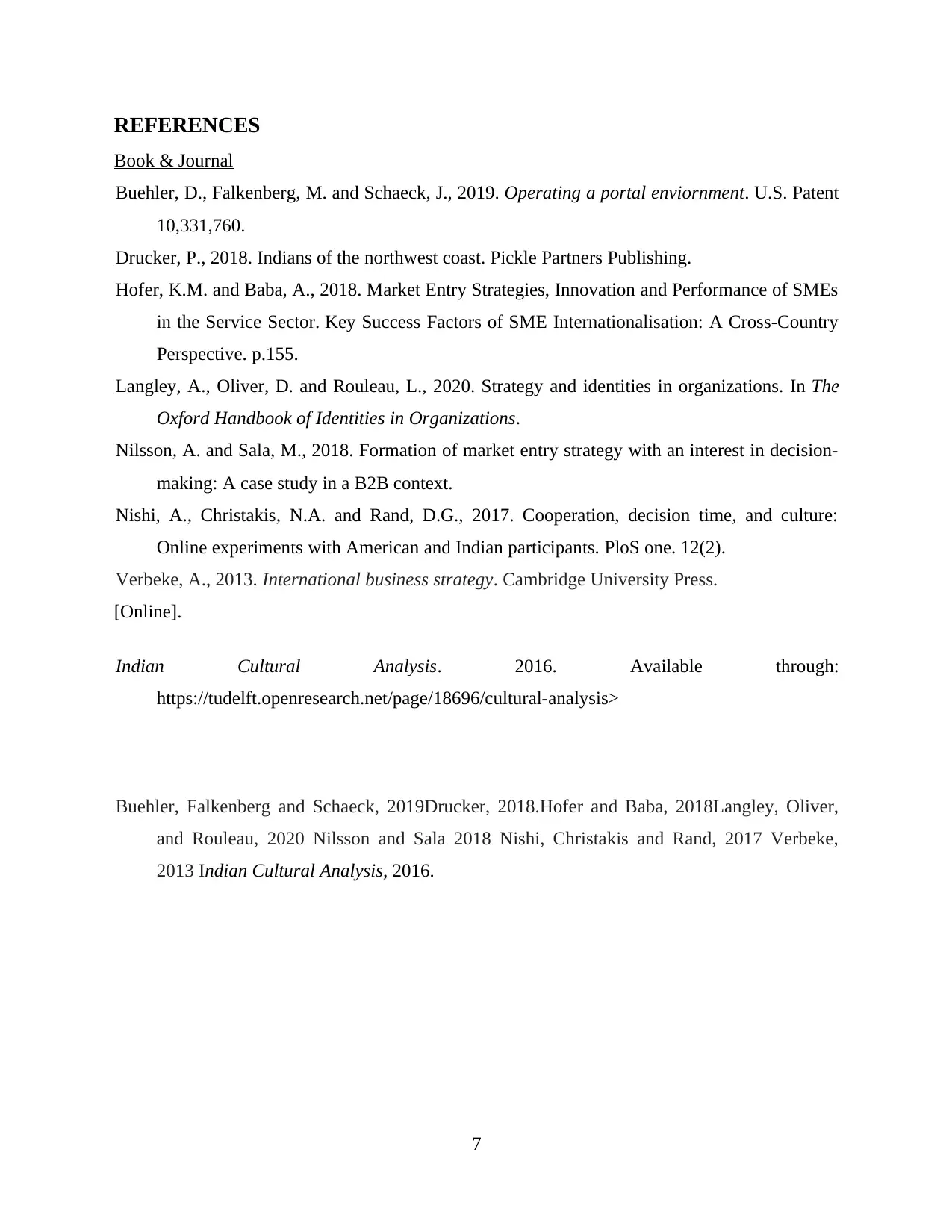
REFERENCES
Book & Journal
Buehler, D., Falkenberg, M. and Schaeck, J., 2019. Operating a portal enviornment. U.S. Patent
10,331,760.
Drucker, P., 2018. Indians of the northwest coast. Pickle Partners Publishing.
Hofer, K.M. and Baba, A., 2018. Market Entry Strategies, Innovation and Performance of SMEs
in the Service Sector. Key Success Factors of SME Internationalisation: A Cross-Country
Perspective. p.155.
Langley, A., Oliver, D. and Rouleau, L., 2020. Strategy and identities in organizations. In The
Oxford Handbook of Identities in Organizations.
Nilsson, A. and Sala, M., 2018. Formation of market entry strategy with an interest in decision-
making: A case study in a B2B context.
Nishi, A., Christakis, N.A. and Rand, D.G., 2017. Cooperation, decision time, and culture:
Online experiments with American and Indian participants. PloS one. 12(2).
Verbeke, A., 2013. International business strategy. Cambridge University Press.
[Online].
Indian Cultural Analysis. 2016. Available through:
https://tudelft.openresearch.net/page/18696/cultural-analysis>
Buehler, Falkenberg and Schaeck, 2019Drucker, 2018.Hofer and Baba, 2018Langley, Oliver,
and Rouleau, 2020 Nilsson and Sala 2018 Nishi, Christakis and Rand, 2017 Verbeke,
2013 Indian Cultural Analysis, 2016.
7
Book & Journal
Buehler, D., Falkenberg, M. and Schaeck, J., 2019. Operating a portal enviornment. U.S. Patent
10,331,760.
Drucker, P., 2018. Indians of the northwest coast. Pickle Partners Publishing.
Hofer, K.M. and Baba, A., 2018. Market Entry Strategies, Innovation and Performance of SMEs
in the Service Sector. Key Success Factors of SME Internationalisation: A Cross-Country
Perspective. p.155.
Langley, A., Oliver, D. and Rouleau, L., 2020. Strategy and identities in organizations. In The
Oxford Handbook of Identities in Organizations.
Nilsson, A. and Sala, M., 2018. Formation of market entry strategy with an interest in decision-
making: A case study in a B2B context.
Nishi, A., Christakis, N.A. and Rand, D.G., 2017. Cooperation, decision time, and culture:
Online experiments with American and Indian participants. PloS one. 12(2).
Verbeke, A., 2013. International business strategy. Cambridge University Press.
[Online].
Indian Cultural Analysis. 2016. Available through:
https://tudelft.openresearch.net/page/18696/cultural-analysis>
Buehler, Falkenberg and Schaeck, 2019Drucker, 2018.Hofer and Baba, 2018Langley, Oliver,
and Rouleau, 2020 Nilsson and Sala 2018 Nishi, Christakis and Rand, 2017 Verbeke,
2013 Indian Cultural Analysis, 2016.
7
⊘ This is a preview!⊘
Do you want full access?
Subscribe today to unlock all pages.

Trusted by 1+ million students worldwide
1 out of 9
Related Documents
Your All-in-One AI-Powered Toolkit for Academic Success.
+13062052269
info@desklib.com
Available 24*7 on WhatsApp / Email
![[object Object]](/_next/static/media/star-bottom.7253800d.svg)
Unlock your academic potential
Copyright © 2020–2026 A2Z Services. All Rights Reserved. Developed and managed by ZUCOL.





